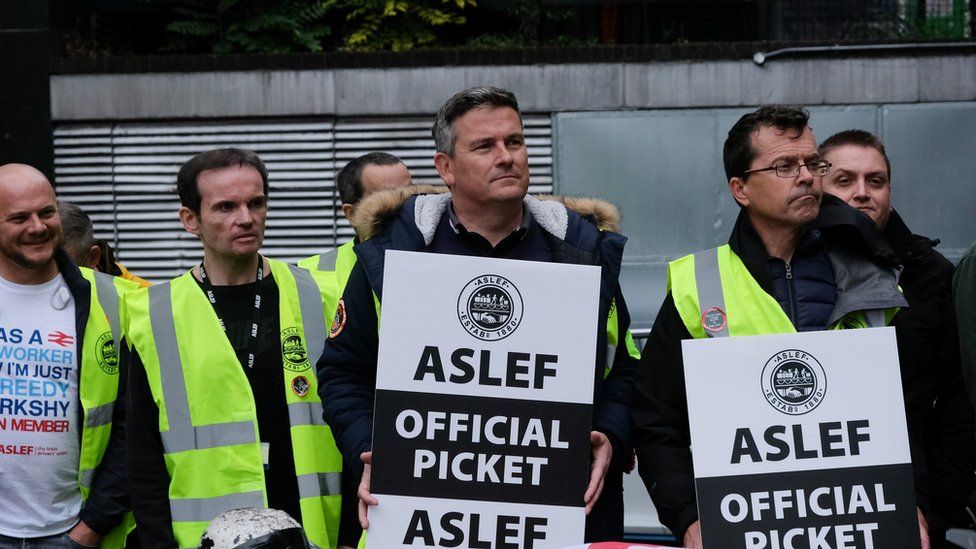ARTICLE AD BOX
 Image source, Getty Images
Image source, Getty Images
By Faarea Masud
Business reporter
A plan to ensure a minimum level of service on transport networks during strikes has been called "doomed" by unions.
The government said the Transport Strikes Bill, which will be presented to MPs on Thursday, aims to avoid further disruption from staff walkouts.
Further strikes are planned on 3, 5 and 7 November.
Aslef, the train drivers' union, said the Bill, if passed into law, would only lead to strikes "lasting longer".
There have been a series of rail strikes in the UK over the past months as unions have clashed with train firms, Network Rail - which maintains and operates railway infrastructure - and the government over pay and conditions.
Prime Minister Liz Truss said: "Hardworking people and businesses should not be held to ransom by strike action which has repeatedly crippled our transport network this year".
She added that the plan will limit unions' "ability to paralyse our economy".
Mick Whelan, general secretary of Aslef - which represents 96% of the train drivers in England, Scotland, and Wales - said the government's proposed minimum service levels "won't work".
"Liz Truss, although clearly a busted flush, is determined to try to make industrial action ineffective.
"The train companies don't want to run minimum service levels because they know it's a stupid idea. What happens when 100% of passengers try to get on 40% minimum service level trains?", Mr Whelan added.
On Wednesday, the latest round of strikes by members of transport union RMT was announced. It is thought only 20% of usual services will run during the strikes, which are planned for early November, and knock-on disruption is likely the morning after strikes.
The RMT called the Bill "autocratic" and "anti union". General secretary Mike Lynch wrote: "This cynical piece of legislation outlaws effective legal industrial action on our railways.
"All democrats whether inside or outside parliament must oppose this draconian attempt to clamp down on the fundamental human right to strike," Mr Lynch added.
Transport Secretary Anne-Marie Trevelyan said: "Strikes have affected nearly all of us over this last year - whether that means losing out on a day's pay at work, having to close your business, missing vital medical appointments or stopping our children from getting to school.
"It is vital that public transport users have some continuity of service to keep Britain moving and growing - this legislation will give everyone the certainty they need to carry on with their daily lives."
The government wrote that economists assessed a loss of £100m to the UK economy during rail strikes in June 2022.
Shadow Transport Secretary for the opposition Labour Party, Louise Haigh MP, said: "Instead of attacking working people, ministers should finally do the job of a responsible government, get around the table and find a resolution to this dispute."
What is the Transport Strikes (Minimum Service Levels) Bill?
A Bill is a proposal for a new law that must be debated and approved by Parliament before being introduced into UK law.
The Department for Transport said the Transport Strikes Bill will mean:
- A minimum service level must be in place during transport strikes - if this is not delivered, the unions will lose legal protections from damages
- Employers will specify the number of staff required to meet an adequate service level during strikes
- Unions must take reasonable steps to ensure an appropriate number of specified workers still work on strike days
- Specified workers who still take strike action will lose their protection from automatic unfair dismissal
The government added that specific details of how minimum service levels will apply will be set out after public consultation.
It added that employers and unions would need to agree a minimum service level "to continue running during all strikes over a three month period". If they fail to do so, the Central Arbitration Committee would determine the minimum number of services.

 2 years ago
43
2 years ago
43








 English (US) ·
English (US) ·